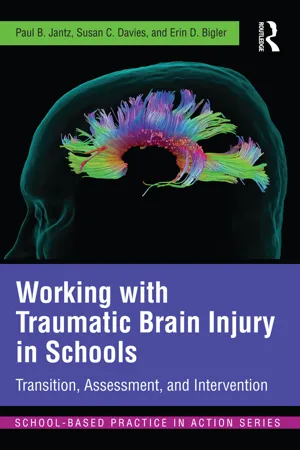
Working with Traumatic Brain Injury in Schools
Transition, Assessment, and Intervention
- 204 pages
- English
- ePUB (mobile friendly)
- Available on iOS & Android
Working with Traumatic Brain Injury in Schools
Transition, Assessment, and Intervention
About This Book
Every day, children and adolescents worldwide return to the educational setting having sustained a traumatic brain injury (TBI). The possible negative consequences of TBI range from mild to severe and include neurological, cognitive, emotional, social, and behavioral difficulties. Within the school setting, the negative effects of TBI tend to persist or worsen over time, often resulting in academic and social difficulties that require formal and informal educational assistance and support. School psychologists and other educational professionals are well-positioned to help ensure students with TBI receive this assistance and support.
Working with Traumatic Brain Injury in Schools is a comprehensive practitioner-oriented guide to effective school-based services for students who have experienced a TBI. It is primarily written for school-based professionals who have limited or no neurological or neuropsychological training; however, it contains educational information that is useful to professionals with extensive knowledge in neurology and/or neuropsychology. This book is also written for parents and guardians of students with TBI because of their integral role in the transition, school-based assessment, and school-based intervention processes. Chapter topics include: basic brain anatomy and physiology; head injury and severity level classifications; biomechanics of injury; injury recovery and rehabilitation; neurological, cognitive, emotional, behavioral, social, and academic consequences; understanding community-based assessment findings; a framework for school-based assessment (TBI-SNNAP); school-based psychoeducational report writing, and school-based interventions; monitoring pharmacological interventions; and prevention. An accompanying website includes handouts, sample reports, and training templates to assist professionals in recognizing and responding to students with TBI.
Frequently asked questions
Information
Table of contents
- Cover
- Title
- Copyright
- Dedication
- Contents
- List of Figures, Tables, and Case Studies
- Series Editors’ Foreword
- Acknowledgments
- 1 Traumatic Brain Injury: An Introduction
- 2 Brain Anatomy and Physiology
- 3 Traumatic Injuries to the Brain
- 4 TBI Recovery and Rehabilitation
- 5 Neurological and Cognitive Consequences of TBI
- 6 Emotional, Behavioral, and Social Consequences of TBI
- 7 Academic Consequences of TBI
- 8 Transitions Following TBI
- 9 Understanding Community-Based Assessment Findings
- 10 School-Based Assessment: A Problem-Solving Framework
- 11 School-Based Psychoeducational Reports
- 12 School-Based Interventions: Emotional, Behavioral, and Social Consequences
- 13 School-Based Interventions: Academic
- 14 Monitoring Pharmacological Interventions
- 15 TBI Prevention and Policy
- References
- Index